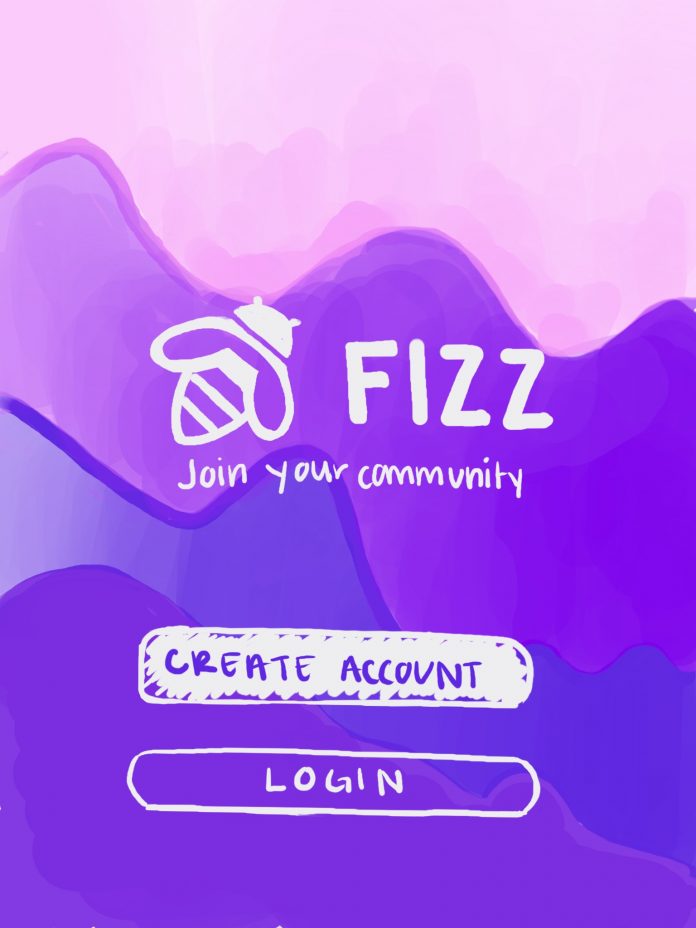Fizz, a social media app designed by two Stanford University dropouts, officially made its way around the College of William and Mary’s campus Jan. 24, 2023. Through copious marketing strategies by co-founders Teddy Solomon and Ashton Cofer, the private platform has received downloads through incentivization of free donuts or quick cash. For Jada Jones ’25, she became involved with Fizz after her suitemate, a paid student promoter of Fizz, offered her a quick opportunity to make money.
“I was able to make $50 by just passing out free donuts for three hours to people who downloaded the app,” Jones said.
Fizz was originally released in the summer of 2021 at Stanford. Amidst COVID-19 restrictions and online classes, Solomon and Cofer aimed to create a stronger undergraduate community through Fizz, which serves as a discussion medium meant to connect students to others of their universities. With a layout resembling that of Reddit, students can post confessions, polls, dubs, memes and more. Users can “ReFizz” (or reshare), comment on posts and either upvote or downvote a post. Furthermore, Fizz posts are anonymous, allowing for individuals to be authentic with what they say.
“I find Fizz very entertaining,” Nicole Hagopian ’26, a new Fizz user, said. “It connects a lot of people together, and it makes jokes but also asks serious questions sometimes, and I think it’s really fun.”
The most unique aspect of Fizz, however, is its exclusivity to certain universities. As opposed to YikYak, an app open to all individuals within a five-mile radius, users must have an authentic university email address to have access to Fizz. Ensuring all posts can only be seen by others in their respective colleges is meant to contribute to creating a stronger campus community.
“It is more specific to William and Mary and the community, not to outside people, so I feel like it’s more relatable,” Hagopian said.
This exclusivity also contributes to content moderation. Because each user can only have one valid university address, being banned results in no further access to the app. Content moderation is done through paid moderators, who are students of the College hired by Fizz for the part-time, remote job.
Advertised at being at other big universities such as Stanford, Dartmouth and Wake Forest, Solomon and Cofer hope to continue expanding the app’s availability to further colleges.
“I was surprised when going on there, seeing just how many upvotes a lot of the posts have,” Jillian Dalrymple ’25, another recent Fizz user, said. “It’s like you go on YikYak, which has been around the school for a long time and…a really popular post would have like 100 upvotes. I went on Fizz, and it’s like several hundred upvotes.”
Fizz’s extreme advertising strategies serve as a plausible explanation for many posts’ high numbers of upvotes. Fizz marketing included Instagram promotions, a donut for a download campaign and flyers around campus with a QR code leading to the app. Students who promoted Fizz on social media had the opportunity to receive $15 in cash, further incentivizing students to endorse Fizz. These minimal effort, quick reward advertising strategies, however, would often result with a download but little or no use of the app.
“I heard about Fizz from someone that was tabling inside Sadler, and they were offering donuts, and my friend wanted one,” Madeline Cornejo ’25 said.
Cornejo went on to explain that she does not use the app often and simply downloaded it for the donut. Despite many students downloading the app for the rewards with little long-term use, Fizz posts are still able to receive extreme amounts of upvotes with some posts even reaching up to 700.
While Fizz’s financial and statistical information is currently not available to the public, its history is not faultless. In November 2021, Fizz experienced a serious data breach uncovered by three Stanford students. Reported in The Stanford Daily, the app was hacked, resulting in a mass disclosure of personal information. Users’ phone numbers and emails were accessible to the hackers, and posts were able to be traced back to its original author. All anonymity was taken away, and it became possible to edit posts, upvotes, downvotes, moderator status and karma values.
According to the aforementioned article in The Stanford Daily, once the hackers notified Fizz of the security vulnerability, Fizz took legal action, stating that any disclosure of the vulnerabilities would result in disciplinary charges. A letter stating the full legalities from Fizz (previously called Buzz) can also be found in the original Stanford Daily article.
The incident ultimately resulted in a statement titled “Security Improvements Regarding Fizz” on Dec. 7, 2021. Though Fizz has largely resolved their data vulnerability issues, most students are unaware of its history due to the app being so new to campus. However, knowledgeable students remain skeptical of the app.
The Flat Hat reached out to Solomon and Head of Community Engagement Sophie Cline on Fizz’s current security status on several occasions but did not hear back. A summary of its security practices can be found on their website in a statement titled “Security Practices at Fizz.”
Fizz’s past history has resulted in much controversy. The Fizz team, however, sees this as no reason to stop pursuing their goal: connecting college students through authentic social media.
“I think that Fizz’s marketing strategies are very promising, and I think that they’re very effective, especially because the students that are promoting Fizz are, you know, they’re downloading Fizz themselves,” Griffin Martin ’26 said.

